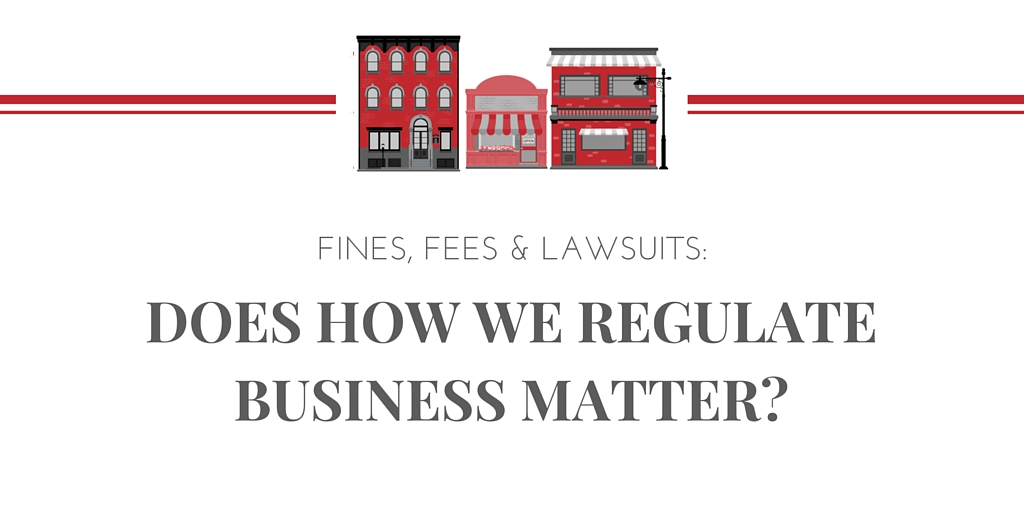 A law designed to protect teen drivers has some parents worried their children will be targeted by predators. The recently passed legislation on puppy mills might shutter some pet stores and animal shelters if the fines it contains are fully enforced. And a decades old consumer protection law is forcing companies to defend multimillion dollar lawsuits over including the phrase “void where prohibited” in their website’s terms and conditions. Each of these situations were discussed during the New Jersey Civil Justice Institute’s 2016 Fall Legal Reform Conference, which focused on the unintended consequences of business regulation.
A law designed to protect teen drivers has some parents worried their children will be targeted by predators. The recently passed legislation on puppy mills might shutter some pet stores and animal shelters if the fines it contains are fully enforced. And a decades old consumer protection law is forcing companies to defend multimillion dollar lawsuits over including the phrase “void where prohibited” in their website’s terms and conditions. Each of these situations were discussed during the New Jersey Civil Justice Institute’s 2016 Fall Legal Reform Conference, which focused on the unintended consequences of business regulation.
Lawmakers, business leaders, and attorneys gathered together on October 11 to discuss this important topic, with a particular focus on New Jersey’s Truth-in-Consumer Contract, Warranty and Notice Act (TCCWNA).
What is TCCWNA?
The Truth-in-Consumer Contract, Warranty and Notice Act is designed to provide consumers a quick and easy way to enforce their legal rights. The Act forbids any seller, lessor, creditor, lender or bailee from violating “any clearly established legal right of a consumer or responsibility of a seller, lessor, creditor, lender or bailee as established by State or Federal law” when they enter into a written contract with a consumer or give or display any “warranty, notice or sign” to a consumer.
If a business violates TCCWNA (which necessarily means they violated some other legal right since the Act itself does not create any new consumer rights), it is on the hook for $100 or actual damages, plus reasonable attorneys’ fees and court costs. Consumers may also petition a court to void a contract that violates TCCWNA.
This all Sounds Pretty Good. What’s the Problem?
At its core, TCCWNA is not a bad idea. Protecting consumers is in fact a very good thing. But in the policy world, good intentions do not always lead to good outcomes.
Instead of empowering individual consumers, the law has ended up enriching attorneys and making consumers as a whole worse off.
The TCCWNA statute is very vague, so courts have allowed attorneys to push its boundaries in ways that the legislature could never have envisioned, particularly when it comes to things like online shopping, which did not exist when the law was passed.
One of the unfortunate aspects of this type of suit is that consumers are more likely to be harmed by it than benefit from it. When one plaintiff brings a lawsuit just on their own behalf, if they win they are going to get the $100 penalty, have their legal costs paid for, and likely benefit other consumers by bringing the violation at issue to the attention of the defendant (who often is acting in good faith).
On the other hand, if a plaintiff brings a successful class action, the most likely outcome is some small amount of money to the named plaintiff (probably more than $100), maybe some sort of award to other members of the class (probably well less than $100 per potential plaintiff), a much larger award to the attorneys, a fix to whatever the violation was, and higher prices on the defendant’s products or services since they have to pay for all this. Under the class action scenario the class members get less than they would have if they had brought their claims individually, and the costs of goods and services increases for everyone.
That’s Not So Good.
During a panel discussion of TCCWNA, which was sponsored by McCarter & English and moderated by Edward Fanning, there was a lot discussion of all this, plus an overview of pending cases, and thoughtful debate about what direction the law should go in order to protect consumers without subjecting businesses who have not done any actual harm to multimillion dollar lawsuits.
The panelists, Zane Riester, McCarter & English LLP; Joseph A. Fischetti, Lowenstein Sandler LLP; Jeff Jacobson, Kelly Drye & Warren LLP; and Joseph J. DePalma, Lite DePalma Greenberg, also went over some practical steps businesses can take to attempt to shield themselves from TCCWNA litigation, and highlighted NJCJI’s efforts to reform this law.
A Broader View
The Fall Conference wasn’t just about TCCWNA, it was really about the much broader topic of business regulation, of which TCCWNA is just one example.
In order to get a feel for how business regulations are crafted, and what actions can be taken when it is apparent that a current regulation is not working out as planned, attendees heard from two key members of our state legislature, Assemblymen Gary S. Schaer (D-Bergen, Passaic) and Jay Webber (R-Morris, Essex, Passaic), and former Chief Counsel to the New Jersey Attorney General, Jeff Jacobson, Kelly Drye & Warren LLP. These current lawmakers and former law enforcer went into great depth talking about governing philosophies and how those sometimes clash with the realities of policymaking.
To cap off the conference, former Ambassador Phil Murphy, who is the current Democratic front-runner for Governor of New Jersey in 2017, gave a talk about why he is running for Governor, and laid out some of his plans to help New Jersey’s economy.

Leave A Comment